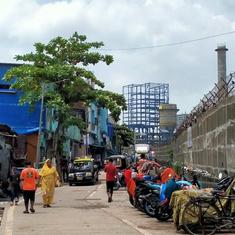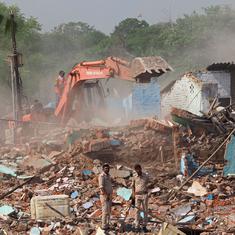CJI recuses himself from hearing Justice Varma’s plea against panel report in unaccounted cash row
The chief justice said that he was part of the process that initiated the in-house inquiry against the High Court judge.

Chief Justice BR Gavai on Wednesday recused himself from hearing a petition filed by Allahabad High Court judge Yashwant Varma, who has challenged the in-house inquiry committee report that indicted him in the unaccounted cash row, Bar and Bench reported.
The matter was mentioned before Gavai by advocate Kapil Sibal, who appeared for Varma and sought an urgent listing of the matter.
Varma’s petition raises constitutional issues, Bar and Bench quoted Sibal as saying while requesting the matter to be listed as early as possible.
The chief justice said that it would not be possible for him to hear the matter because he was also “a part of the committee”, Bar and Bench reported. He added that he will constitute a bench and list the matter for hearing, The Hindu reported.
Gavai was likely referring to his involvement in the process of initiating the in-house inquiry during the tenure of Sanjiv Khanna, the chief justice at the time. The court had set up a three-member committee to look into the allegations against Varma.
The development on Wednesday came as the process to impeach Varma has been set in motion in the Monsoon Session of Parliament. On Monday, 149 Lok Sabha members and 63 Rajya Sabha members signed two separate notices seeking his removal.
To impeach a judge in Parliament, a removal motion is required to be signed by 100 Lok Sabha MPs or 50 Rajya Sabha MPs. If the motion is admitted, a three-member judicial committee investigates the matter. The Parliament votes on the impeachment if the committee finds misconduct. If the motion gets two-thirds of the votes, the president is advised to remove the judge.
On July 18, Varma had moved the Supreme Court against the in-house panel’s findings, arguing that it creates a “parallel, extra-constitutional mechanism” and undermines the procedure laid out in law, which vests the power to remove High Court judges in Parliament.
Varma also challenged the recommendation made by Khanna to the president and the prime minister to initiate impeachment proceedings against him.
In his petition, Varma argued that the in-house inquiry committee had reached conclusions without giving him a fair opportunity to respond.
The committee proceeded in a pre-determined fashion and without finding concrete evidence, his petition said, adding that it merely drew adverse inferences against him after reversing the burden of proof.
Unaccounted cash was allegedly recovered at Varma’s official residence in Delhi when emergency services responded to a fire there on March 14. He was a judge at the Delhi High Court at that time. The judge said he was in Bhopal when the cash was discovered and claimed that it did not belong to him or his family.
Amid the row, he was transferred to the Allahabad High Court.
On March 22, the Supreme Court released a report, including a video and three photographs, showing bundles of notes that were allegedly recovered from the judge’s home.
The redacted report showed that Delhi High Court Chief Justice Devendra Kumar Upadhyaya had written to Varma on March 21, asking him to “account for the presence of money/cash” in a room located in his bungalow.
After Varma declined to voluntarily retire or resign, Khanna sent the final inquiry committee report on the incident to the president and the prime minister.
The committee in its report had concluded that there was “sufficient substance” in the charges against Varma. The report, dated May 3, held that the judge’s misconduct was “serious enough to call for initiation of proceedings for removal”.
However, the report did not address questions about how the fire started, how much money was found, where the cash came from or where it is now.
Also read: Five crucial questions the report indicting Justice Varma does not answer









